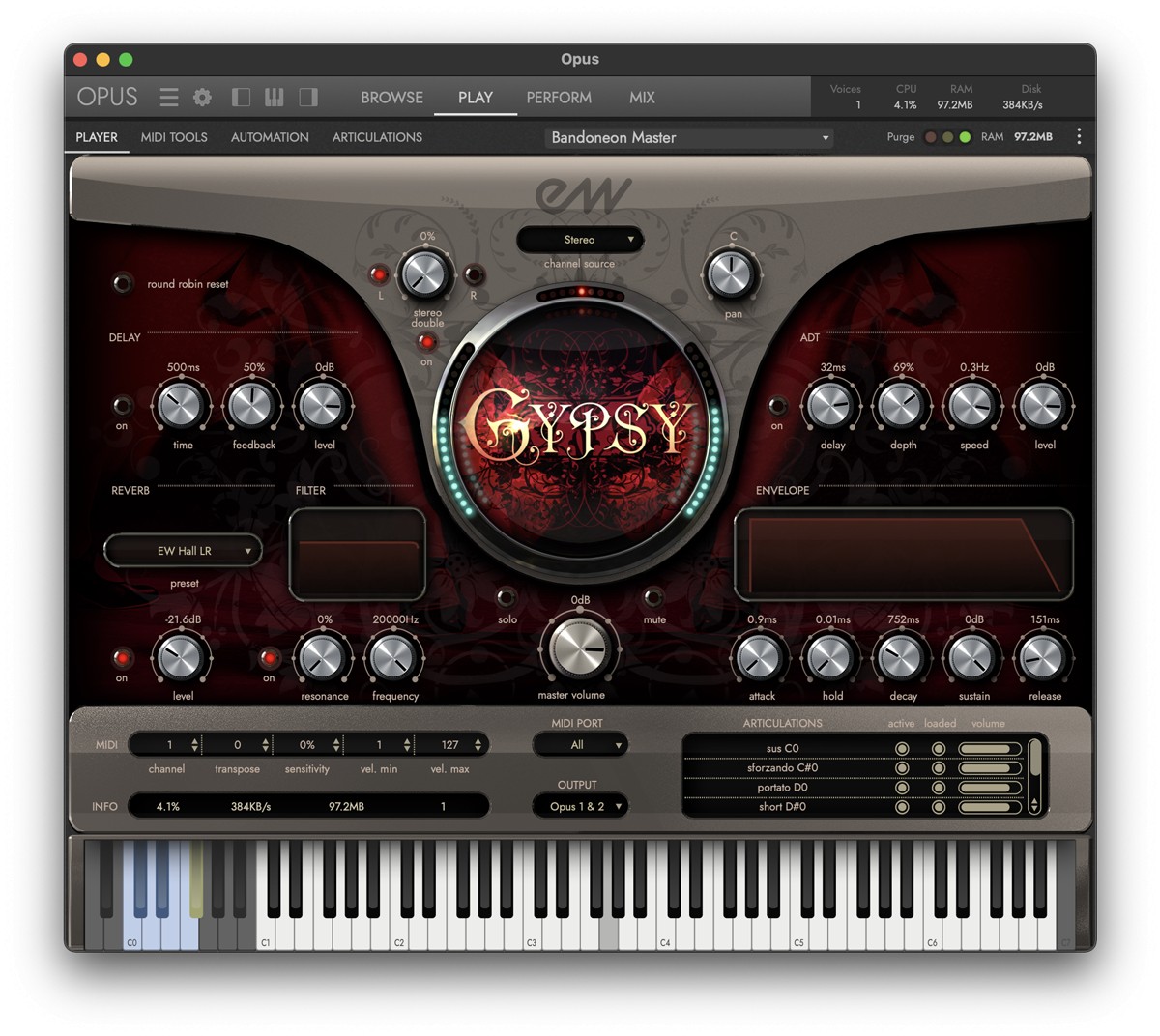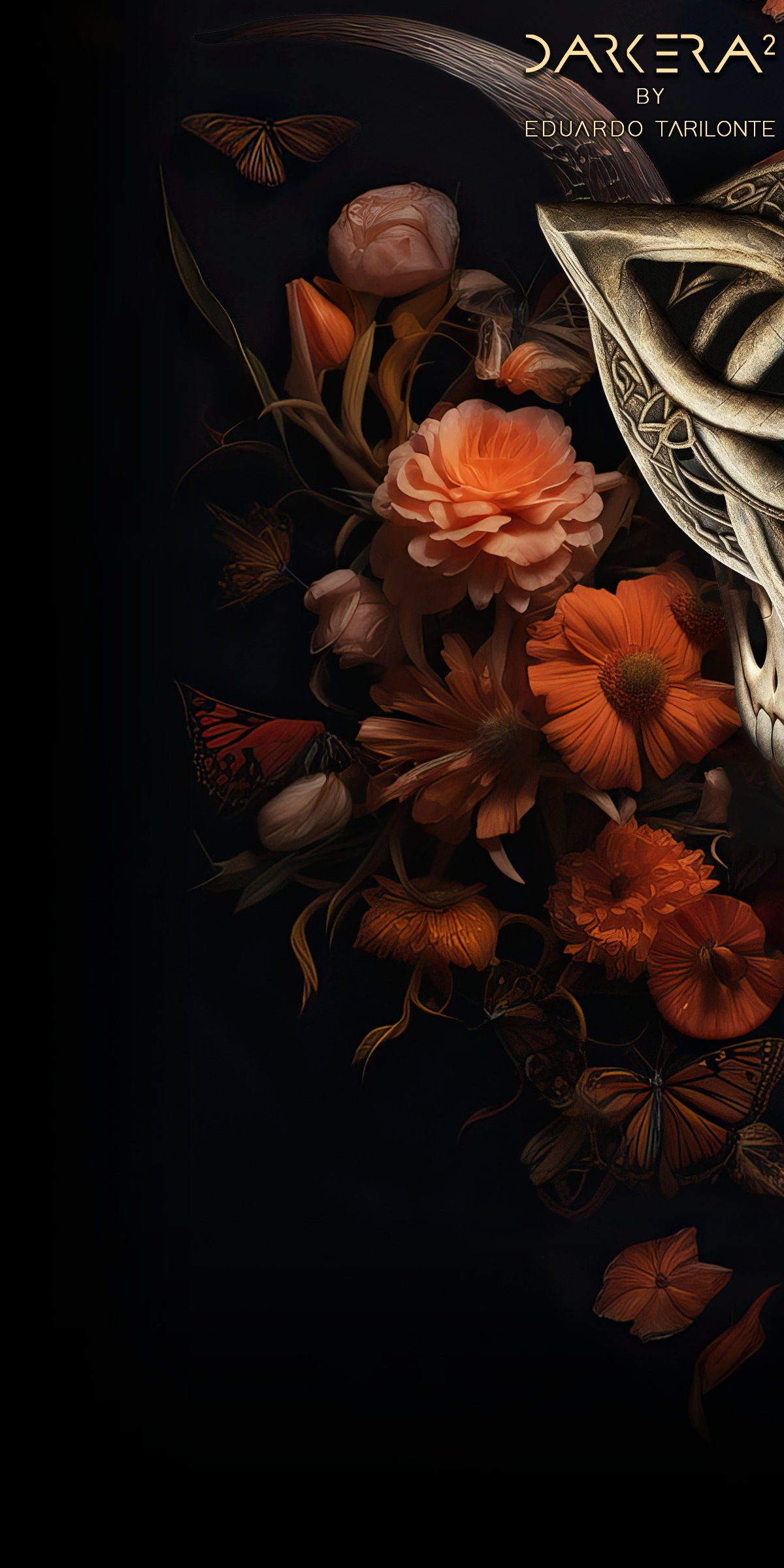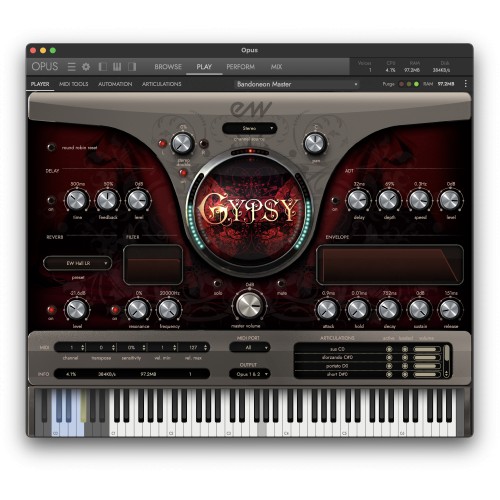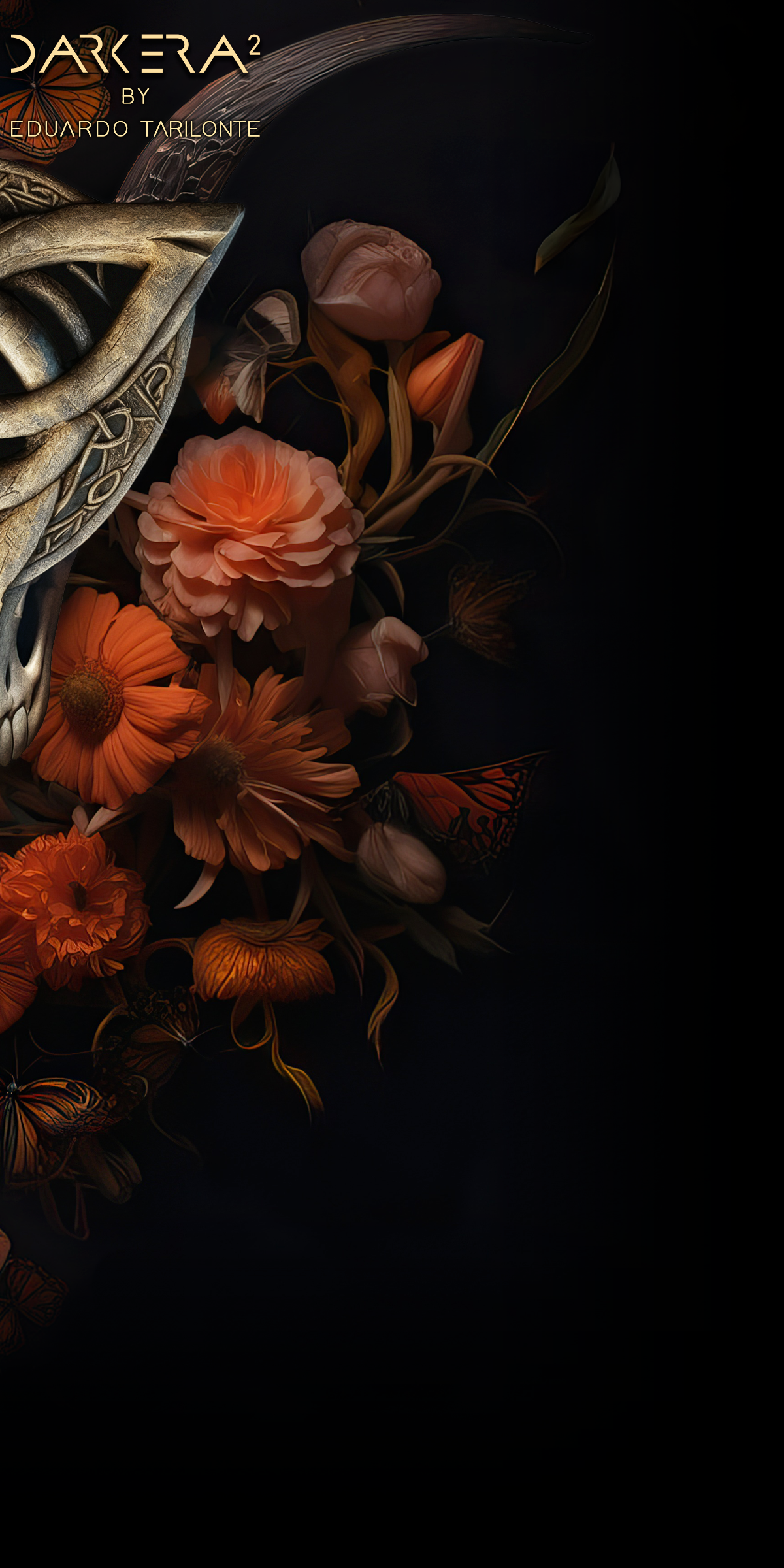The virtual Gipsy orchestra from East West, Hollywood
Quantum Leap Gypsy which is primarily aimed at film, TV and game composers, captures an intimate European sound with an unprecedented detail that will simply amaze listeners. The nylon string guitar, violin and trombone can play in both gypsy and classical styles. In the classical realm, these three instruments are unparalleled in the sampling world in terms of playability, diversity and sound quality.
“All of the guitars were sampled with up and down strokes, many velocities and picking styles, various picking angles, release trails, chords and effects,” states Quantum Leap Gypsy producer Nick Phoenix. “Gypsy’s guitars, played by top Los Angeles session guitarist David Kole, simply have to be heard to be believed.”
 Key features of QUANTUM LEAP GYPSY include:
Key features of QUANTUM LEAP GYPSY include:
The violin and trombone feature many articulations, repetitions and even true legato intervals. The trombone in QUANTUM LEAP GYPSY was recorded in EASTWEST Studio 1 (formerly United-Western Studios), referred to by many engineers as “the best brass room on the planet.”
The accordions feature multiple setups, all with air flow in and out samples as well as expressive samples, chords and left-hand bass. True to its name, Gypsy also features a gypsy percussion program and extensive flamenco dancers’ foot stomps, as well as traditional castanets.
Key features of QUANTUM LEAP GYPSY include:
- Violin (true legato intervals) in classical and gypsy style
- Classical Guitar
- Flamenco Guitar
- Django Style Guitar
- Spanish Steel String Guitar
- Campana Accordion
- Silvestri Accordion
- Excelsior Accordion
- Trombone (true legato intervals) in classical and gypsy style
- Flamenco Dancer
- Gypsy percussion
- Superior reverb impulses
This flamenco library has four accordions (one of them a bandoleon), three guitars, percussion, cimbalo, flamenco percussion and two flamenco dancers, trombone, and a wonderfully over-the-top gypsy violin. That violin is probably the most high-profile instrument in this library, with its big, rich sound. The Master program brings up a large variety of keyswitched articulations (24 if anyone?s counting), plus there?s a legato auto-sensing program; turn up the mod
wheel, and instead of playing connected notes in one bow, you?ll bring in some serious portmento, the kind that?s absolutely essential for a hammed-up gypsy violin part. This instrument is a lot of fun if you cheese it up, but it works well for other kinds of music as well. It might be miked a little close-up for classical, but you can move it back by adding some reverb. And the close-up sound is just right for a gypsy violin, plus the default EW Fat Hall sounds really
good on it. The trombone is another highlight, and it?s also quite versatile. Its Master program has eight different articulations, and its legato program has real recorded slides between notes. One of the keyswitches brings in blatty tones (?farty? in the manual), which lets it work well in all kinds of contexts. The accordians are all really good and full of character, with air in and out samples, and lots of other goodies. They can sound remarkably real. Gypsy?s
flamenco guitar has a lot of characteristic strums and noises recorded and assigned to keyswitches?taps, tremolo, etc. For the most part they want to be overdubbed and turned down, because they?re at the same level as the notes. The Django guitar has several chord types assigned to keyswitches, and it makes it easy to create surprisingly Django-like parts. Then there?s a Spanish steel guitar, the percussion and flamenco dances, a cimbalom?and finally what for me personally is the hit of all four libraries: the classical guitar. That instrument is absolutely lovely, and the programming is excellent. Between the velocity layers, auto-round robin samples, release samples, and above all the overall
sound, it?s a real joy to play. I personally would find Gypsy worth the price just for that instrument, but it has a lot of other great stuff too. - VIRTUAL INSTRUMENT MAGAZINE
EastWest has recently come out with a handful of sample libraries using their new 64-bit Play engine. I was assigned Gypsy, a collection of Mid-Eastern and European instruments. From what I've experienced so far, it is a remarkable tool with extremely high production values, an attention to detail, and an even greater consideration to the end-user experience. In the box is two DVD?s. Yet on those two DVD?s are some exquisitely captured instruments, an intuitive interface and implementations, and a robust, powerful playback engine, aptly titled PLAY. So you get 11GBs of ethnic guitars, accordions, trombones, rare percussion, and just about the best sampled violin and violin performance
you?ll find anywhere. The 64-bit PLAY engine really brings these recordings to life by not simply reproducing the recording, but truly reproducing the performance. They do this by a very intuitive articulation implementation and appropriate parameters to tweak such as reverb types (several real world convolution based settings), ADSR of course, other filters and delays to create exactly the sound you are looking to capture. About the articulation implementation: Very nice. Initially, it?s hard to describe because?well, you?d expect it to be a lot more complicated to evoke the exact performance you want. Intuitive is definitely the word. I don?t want to overuse the term, but ?intuitive? to me is something that works the way you expect it to, and works well. Typically, playing any of these instruments at default settings is just amazing, you almost don?t want to mess with the settings too much because the presets are great. The PLAY engine really captures how you play and adapts it to that instrument. Guitars, for instance have a second sampled note when the same note is played again to differentiate between the first and second strum. This simple idea really opens up the world of MIDI-based guitar at least for me, and will save me a ton of editing time when playing in some guitar lines in the future. Also for bowed instruments we have superb legato detection. Running notes into each other, the engine detects and keeps the initial ?bow? of the first note and slides the other notes in if you so choose and can then change playing style with a simple key switched mapped to the keyboard. On the interface itself is a representation of all the articulations available to a particular instrument and what key that switch may be mapped. Double that with on-screen key switch highlighting, and it seems like you can never be lost, or want of
directions on what does what or why. In a word, intuitive! Really, when looking at the product, was there anywhere else to go? I listen to a ton of soundtracks and work as an audio engineer, so I can spot samples versus true performance regardless of recording techniques, usually. Save for a few instruments in certain key ranges, the performances here are impeccable. When you pair this up with the top-notch PLAY engine, you get an unbeatable duo. There is some true character represented in Gypsy, one that I think a lot of musicians will want to inject into their compositions. Even more than that, I?m always enthralled when something inspires me to create, which is what I believe this
library does beautifully. -MUSIC4GAMES Review: GYPSY This flamenco library has four accordions (one of them a bandoleon), three guitars, percussion, cimbalo, flamenco percussion and two flamenco dancers, trombone, and a wonderfully over-the-top gypsy violin. That violin is probably the most high-profile instrument in this library, with its big, rich sound. The Master program brings up a large variety of keyswitched articulations (24 if anyone?s counting), plus there?s a legato auto-sensing program; turn up the mod
wheel, and instead of playing connected notes in one bow, you?ll bring in some serious portmento, the kind that?s absolutely essential for a hammed-up gypsy violin part. This instrument is a lot of fun if you cheese it up, but it works well for other kinds of music as well. It might be miked a little close-up for classical, but you can move it back by adding some reverb. And the close-up sound is just right for a gypsy violin, plus the default EW Fat Hall sounds really
good on it. The trombone is another highlight, and it?s also quite versatile. Its Master program has eight different articulations, and its legato program has real recorded slides between notes. One of the keyswitches brings in blatty tones (?farty? in the manual), which lets it work well in all kinds of contexts. The accordians are all really good and full of character, with air in and out samples, and lots of other goodies. They can sound remarkably real. Gypsy?s
flamenco guitar has a lot of characteristic strums and noises recorded and assigned to keyswitches?taps, tremolo, etc. For the most part they want to be overdubbed and turned down, because they?re at the same level as the notes. The Django guitar has several chord types assigned to keyswitches, and it makes it easy to create surprisingly Django-like parts. Then there?s a Spanish steel guitar, the percussion and flamenco dances, a cimbalom?and finally what for me personally is the hit of all four libraries: the classical guitar. That instrument is absolutely lovely, and the programming is excellent. Between the velocity layers, auto-round robin samples, release samples, and above all the overall
sound, it?s a real joy to play. I personally would find Gypsy worth the price just for that instrument, but it has a lot of other great stuff too. - VIRTUAL INSTRUMENT MAGAZINE
EastWest has recently come out with a handful of sample libraries using their new 64-bit Play engine. I was assigned Gypsy, a collection of Mid-Eastern and European instruments. From what I've experienced so far, it is a remarkable tool with extremely high production values, an attention to detail, and an even greater consideration to the end-user experience. In the box is two DVD?s. Yet on those two DVD?s are some exquisitely captured instruments, an intuitive interface and implementations, and a robust, powerful playback engine, aptly titled PLAY. So you get 11GBs of ethnic guitars, accordions, trombones, rare percussion, and just about the best sampled violin and violin performance
you?ll find anywhere. The 64-bit PLAY engine really brings these recordings to life by not simply reproducing the recording, but truly reproducing the performance. They do this by a very intuitive articulation implementation and appropriate parameters to tweak such as reverb types (several real world convolution based settings), ADSR of course, other filters and delays to create exactly the sound you are looking to capture. About the articulation implementation: Very nice. Initially, it?s hard to describe because?well, you?d expect it to be a lot more complicated to evoke the exact performance you want. Intuitive is definitely the word. I don?t want to overuse the term, but ?intuitive? to me is something that works the way you expect it to, and works well. Typically, playing any of these instruments at default settings is just amazing, you almost don?t want to mess with the settings too much because the presets are great. The PLAY engine really captures how you play and adapts it to that instrument. Guitars, for instance have a second sampled note when the same note is played again to differentiate between the first and second strum. This simple idea really opens up the world of MIDI-based guitar at least for me, and will save me a ton of editing time when playing in some guitar lines in the future. Also for bowed instruments we have superb legato detection. Running notes into each other, the engine detects and keeps the initial ?bow? of the first note and slides the other notes in if you so choose and can then change playing style with a simple key switched mapped to the keyboard. On the interface itself is a representation of all the articulations available to a particular instrument and what key that switch may be mapped. Double that with on-screen key switch highlighting, and it seems like you can never be lost, or want of
directions on what does what or why. In a word, intuitive! Really, when looking at the product, was there anywhere else to go? I listen to a ton of soundtracks and work as an audio engineer, so I can spot samples versus true performance regardless of recording techniques, usually. Save for a few instruments in certain key ranges, the performances here are impeccable. When you pair this up with the top-notch PLAY engine, you get an unbeatable duo. There is some true character represented in Gypsy, one that I think a lot of musicians will want to inject into their compositions. Even more than that, I?m always enthralled when something inspires me to create, which is what I believe this
library does beautifully. - MUSIC4GAMES

Computer Music, 4 Stars

John Powell
Hancock, Kung Fu Panda, The Bourne Trilogy
"I am a big fan of the EastWest / Quantum Leap libraries. Their collections contain generous sound palettes with great attention to detail. I am also very impressed by the power of the PLAY engine."
This library includes "Opus" as a Sample-Player.
Mac:
- macOS 10.13 or higher
- 64 bit
- Quad-Core CPU (Octa-Core recommended)
- 2,7 GHz or higher
- RAM: 16GB (32GB or more recommended)
- SSD hard drive (SATA or PCIe)
Windows:
- Windows 10 or higher
- 64 bit
- ASIO sound driver
- Quad-Core CPU (Octa-Core recommended)
- 2,7 GHz or higher
- RAM: 16GB (32GB or more recommended)
- SSD hard drive (SATA or PCIe)
Required Registration:
EastWest products require you to register with the manufacturer at www.soundsonline.com and with www.ilok.com to activate your license.
This product requires an activation!
You can either "soft" activate on your computer without addditional hardware or transfer the license to an iLok USB dongle which has to be purchased separately. The iLok dongle can be used to run the protected software on different computers. Your licenses can be easily manged using the iLok Licence Manager. To protect your investment against theft or loss we recommend the iLok Zero Downtime protection with TLC.
An internet connection on any computer and a free user-accout at www.ilok.com is required to authorize the product.
Please check with the software manufacturer which iLok version is required at least if you want to use a hardware iLok!





